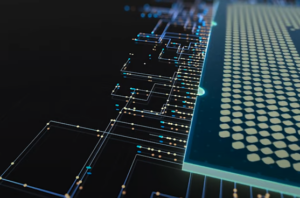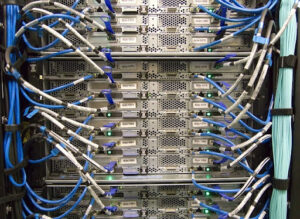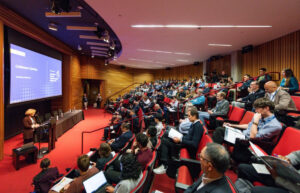
Message from Carol
Dear Colleagues:
As we approach a new year, the national laboratories continue to serve as an important scientific resource. I am struck by how well we continue to be positioned to pursue future opportunities, by deploying our expertise and capabilities to address key national and global challenges.
Below you’ll find a story about a recent report authored by the National Laboratory Directors Council that lists many ways the national labs can help ensure the continued leadership and security of the United States. One specific topic of interest is, of course, artificial intelligence. Many of you are aware of and have participated in the Lab’s AI@LBNL webinars and internal workshops over the last few months. These discussions have been very valuable for our own understanding of the Lab’s particular strengths that we can bring to bear on this topic. They also helped prepare us for discussions with our sponsors within DOE.
Indeed, many of the areas of opportunity for us benefit from these types of collaborative discussions, with partners within and beyond the Lab. In this issue, you’ll find stories about our discussions across the Lab and with the DOE and external partners about energy-efficient data centers, a topic that has become ever more important given assessments of the future power demands of artificial intelligence. And you will read about how we have helped convene a summit among participants in the battery ecosystem on advanced battery manufacturing in California and the U.S. We are fortunate to work at a national lab with an impressive breadth and depth of expertise and resources, and I look forward to the discussions about how we can best leverage them to solve problems faced by our nation and the world.
I thank you all for the commitment that you bring to the Lab daily and I wish you all a restful and happy Thanksgiving and holiday season.
Sincerely,
Carol Burns
Deputy Laboratory Director for Research
Chief Research Officer
“Ensuring U.S. Leadership in a Competitive Future”: A Report from the National Laboratory Directors Council

In a hyper-competitive world where the pace of scientific and technological progress is at an all-time high, what is the role of the national labs in ensuring the continued leadership and security of the United States? A recent report authored by the National Laboratory Directors Council, titled “Ensuring U.S. Leadership in a Competitive Future” (also known as “2024 Horizon Scan”), provides the perspective of the 17 national laboratory directors.
AI@LBNL Webinars and Workshops

As AI continues to shape the future of scientific discovery, energy delivery, and national security, Berkeley Lab has been actively engaging with its research community to harness AI’s potential. Over the past several months, the Lab hosted a series of webinars on AI aimed at deepening our understanding of AI activities and exploring strategies for advancing scientific AI.
On October 7-8, the Lab held the AI@LBNL Workshop, showcasing our strengths in scientific research, data science, and computing methodologies, positioning the Lab at the forefront of AI-driven discovery. Participants collaborated to identify key challenges AI can address and the investments needed in technology, partnerships, and research to drive future initiatives. More than 350 attendees engaged in discussions on topics such as DOE’s AI initiative, AI-ready data, and models for science.
Visit the AI@LBNL Webinars and Workshop page for the presentations and recordings (LDAP access required).
Addressing Data Center Energy Efficiency Challenges Posed by the Growth of AI

Artificial intelligence is potentially a game changer for science and industry, promising efficiencies that can accelerate research, improve productivity, and enable major advances. It is also a significant factor in the expanding demand for power. Berkeley Lab, which has a long history of expertise in data center energy efficiency, is working on a number of fronts to explore opportunities for data center energy efficiency improvements in an AI world.
From Innovation to Manufacturing: California’s Battery Ecosystem Conference

Batteries are critical to global competitiveness and domestic energy security. With their growing applications in the defense sector, they are also important to our national security. Yet today the U.S. represents only seven percent of the world’s battery production capacity, making it overly reliant on foreign supply chains and manufacturing. This September, Berkeley Lab, SLAC National Accelerator Laboratory (SLAC), and Lawrence Livermore National Lab (LLNL) hosted a multi-stakeholder conference to explore ways California can provide leadership on U.S. battery manufacturing.
Read the story about the conference and opportunities for the Lab to have an impact on advanced battery manufacturing in California and the nation.
GOOD TO KNOW
SPO/Conflict of Interest Reminder: NIH Projects Require Research Performance Progress Report (RPPR)
For all NIH projects, NIH requires annual reporting of conflict of interest (COI). Use the online DFI-2 PHS and DFI-3 PHS forms. As part of the COI reporting, a non-competing continuation proposal is also required in eSRA, with the COI forms attached.
Questions? Contact the COI office at coi@lbl.gov.
SciENcv Reminder for NASA, NSF, and NIH Proposals and Sub-proposals
Proposals to NSF, NASA, NIH, as well as non-federal proposals with these agencies as Prime Sponsor, should use the SciENcv website to generate proposers’ biosketches, current and pending support, and other required forms. SciENcv is used to enforce the policies of these agencies, specifically certification related to Malign Foreign Talent Recruitment (MFTR) programs. Forms that are not submitted using this platform have to be re-entered by the PI in SciENcv.
Learn more about how to use SciENcv. Other links: NSF SciENcv, NIH SciENcv. For questions related to proposals, contact your pre-award resource analyst.
Updated Website for Office of the Deputy Lab Director for Research

The Office of the Deputy Lab Director for Research has an updated website, providing access to the Career Pathways Office, Discretionary Funding Office, Intellectual Property Office, Strategic Partnerships Office, Office of National and Homeland Security, and Research Compliance Office. The site also offers resources on strategic planning for research at the Lab, research funding, policies and guidance, innovation and entrepreneurship, professional development, and more.
Check out the updated website.
New Office of National and Homeland Security Website

The Office of National and Homeland Security has launched a new web presence, enhancing visitors’ online experience when exploring their research, people, and capabilities.
PIER Plan Playbook Now Available

The LBNL PIER (Promoting Inclusive & Equitable Research) Plan Playbook is now available for the Laboratory community. This Playbook and Quick Reference Guide is designed to help Lab researchers and staff build successful PIER Plans required for DOE Office of Science research proposals, in ways that directly advance and propel the scientific and technical excellence of their proposed research. The Playbook addresses common issues with practical recommendations, accompanied by examples and links to available Lab resources.

